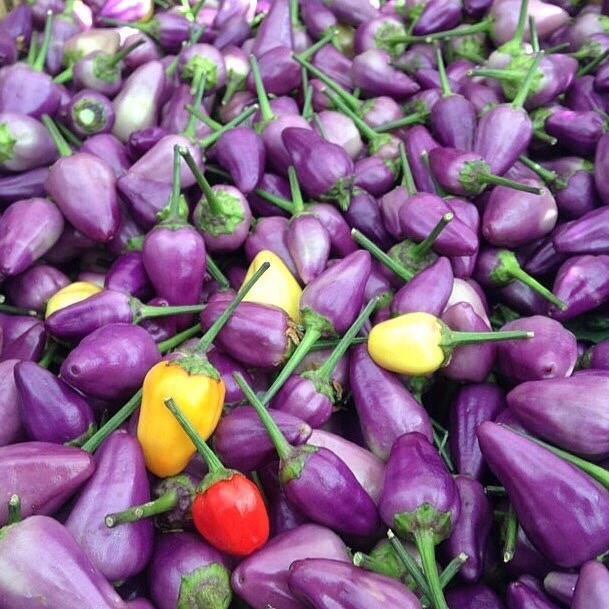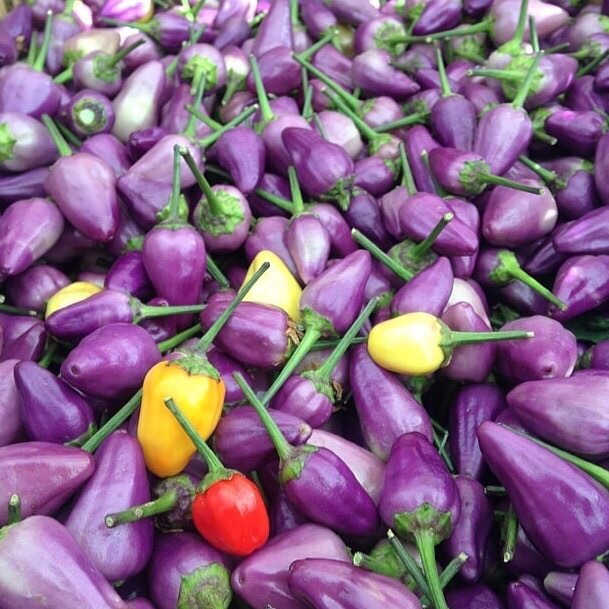by The Wholey Trinity

Today’s society has lost the art of eating with the seasons. We take for granted that every time we visit our neighborhood grocer we can always find staples like tomatoes, broccoli, asparagus, strawberries, and numerous other produce. In fact, if you were to ask the average consumer, “Which produce is in season right now?” they probably wouldn’t know how to answer.
““seasonal” meant whatever Mom was cooking up that night.”
If you had asked me that same questions a few years ago, I know I sure wouldn’t! As a woman who was raised in the modern-day Midwest, the only seasonal produce I ever knew were apples in the fall and corn in the summer. Other than that, “seasonal” meant whatever Mom was cooking up that night.
Don’t get me wrong, our modern-day advances are not something I am complaining about (indoor plumbing, bless you!) However, I do feel there comes a point where we should stop trying to go against Mother Nature and start working with her.
One of these ways is by embracing the gift of seasonal produce! Here are some of the great benefits of eating seasonally.
1. Health Benefits that Work With the Seasons
Mother nature has given us select fruits and vegetables to help us defend against seasonal elements. For example, mushrooms, which are high in Vitamin D, are at their peak during the winter, when there is less sunlight and our bodies need more of this vitamin to help defend against colds and flu. In the summer, berries and bell peppers are at their peak, which are high in antioxidants like Vitamin C. More antioxidants help combat the free radicals in our bodies from higher solar radiation during these summer months.
However, when we neglect to eat these in-season fruits and veggies, we don’t get nature’s build-in defence mechanisms. It would be like wearing wool gloves and snow boots in the summertime. Seasonally, it just doesn’t make sense.
2. Eating Locally
When talking about the health benefits listed above, obviously this is going to vary by region. If you did not get my gloves and snow boots example, then you are probably not from the Midwest. Thus, you don’t necessarily need that boost of Vitamin D during the winter months if you live near the equator and the sun exposure needed for your body to produce this vitamin is not an issue for you.
Therefore, you are going to eat seasonally for your region. You not only reap all those benefits of seasonal produce, but you are support local farmers as well! The best way to know what is in season where you live is by going to a local farmers market. There you get freshly picked fruits and vegetables and you can chat with the people that actually grew what you are about to feed your family. It is also much more cost effective to buy from a local farmer’s market! What a win-win!
3. Getting Out of Your Comfort Zone
As someone who is quite an adventure-seeker, this is one of my favorite parts of eating seasonally; experimenting with new produce. When you just stick to your same-old, same-old routine of getting potatoes and tomatoes every time you go to the grocery store, you are depriving yourself the experience of trying other tasty, new foods!
For example, this winter I decided to try delicata, spaghetti, and acorn squash instead of my usual butternut. Wow, am I glad I did! I cook with at least one of them every week now. I have also found by experimenting with these different produce, I have definitely upped my culinary game! All because I have challenged myself to go outside of my veggie comfort zone. And by the time I am sick and tired of eating all these gosh-darn squash, it’ll be time to delve into the springtime produce!
4. Environmentally Friendly
As I stated before, when you eat seasonally, you are more likely to be buying your fruits and vegetables from local farmers. This is extremely beneficial not only for us, but also for our environment!
Let’s look at those prepackaged corn cobs you might buy from the grocery store. Corn is one of Brazil’s highest exported produce, so we will (for argument’s sake) say that the corn you bought came from Brazil. Think of that conglomerate company that uses heavy machinery to mass produce and harvest all that corn. Think of that of that huge warehouse that uses assembly lines to breakdown, sort, and package the corn. Now think of the thousands of miles it had to travel just to get to your grocer. Think of the fuel for the truck, boat, and/or plane that transported it. Then think of the packaging the corn on the cob comes in when you buy it (that will be thrown away). That ends up being a lot of pollution!
Now think of your local farmer who grows corn (and more than likely uses sustainable and eco-friendly farming practices). These farmers likely have farm hands that go out and harvest the corn. Then they throw the corn into reusable bins and containers to bring to the farmers market 50-100 miles away (give or take). You drive about 15-20 minutes to get to that farmers market and purchase the corn, husk and all. They may give you a plastic bag to carry your corn or you may just put it in your reusable shopping bag (if you are a seasoned farmers market attendee). This uses significantly less fuel and packaging! You get delicious, fresh corn and help the planet. Look at you go!
Do you eat seasonally? What are your thoughts? Let us know below!
Hannah Eddy is the voice behind The Wholey Trinity, a blog dedicated to advocating for holistic health and nutrition. She is a dietitian-in-training and believes that true health encompasses the mind, body, and spirit, aka The Wholey Trinity. Hannah is a current graduate student at Fontbonne University in St. Louis, MO where she is getting her Master’s in Multidisciplinary Health Communication Studies and completing her dietetic internship. She loves experimenting in the kitchen, fitness, and curling up with a good cup of tea!



